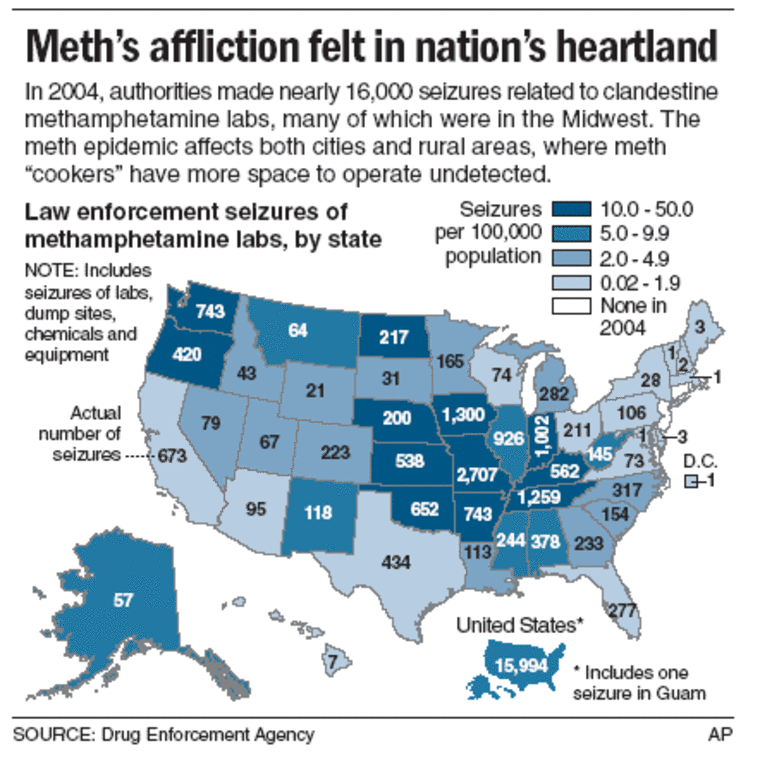State leaders in Oklahoma say methamphetamine was ripping the heart out of their state a few years ago. It was costing billions in law enforcement, prevention, and treatment, and was by some accounts, the biggest crime problem in the state.
“For the last 10 years, here in Oklahoma, we have seen meth labs skyrocket; literally, a 12,000 percent increase,” said Oklahoma Bureau of Narcotics and Dangerous Drugs Control spokesman Mark Woodward. “We went from 10 labs in 1994 to more than 1,200 labs in 2003.”
In 2002, authorities seized almost 1,300 meth labs in Oklahoma.
Today, lab seizures are down 70 percent, according to the Oklahoma Bureau of Narcotics and Dangerous Drugs Control.
Last year, the Oklahoma legislature enacted a bill that limits the sale of cold and allergy medicine, pseudoephedrine, a key component in “cooking” the drug. The law requires the ingredient to be sold behind the pharmacy counter and customers have to show identification and are limited on the amount they are allowed to buy.
Oklahoma's new restrictions have been so successful that other states, as well as private enterprise, are following suit.
“You can still get it. You just need to show your ID and sign the log book first,” said Woodward.
Scourge across heartland
Meth, and its effect on users and innocent bystanders, is an exploding epidemic in the nation’s heartland.
The Drug Enforcement Administration (DEA) says methamphetamine is the number one drug of choice in rural America. It can be made with simple materials; mason jars and coffee filters, and is cheap to make.
With about $100 in materials, a maker can produce $1,000 worth of meth. In the last year, police busted more than 9,300 meth labs nationally, nearly a 500 percent increase from 1996, according to the DEA.
Oklahoma setting national example
Oklahoma’s success in regulating the sale of pseudoephedrine has prompted 12 states —Arkansas, Georgia, Illinois, Iowa, Kentucky, Kansas, Mississippi, Oregon, South Dakota, Tennessee, West Virginia, and Wyoming — to tackle the nation’s growing meth problem by placing limits on the cold medicine. At least twenty more states are considering similar measures.
Tennessee authorities found almost 1,600 meth labs in the state last year. Rep. Charles Curtiss sponsored a state bill that mimicked Oklahoma’s landmark legislation. It passed in March.
“This problem had reached epidemic levels and the majority of the meth labs discovered in the southeastern United States were discovered in Tennessee,” said Curtiss. “Other states are passing legislation in order to curb the growth of this plague on society.”
Woodward credits Oklahoma’s success for the other states’ action. “They’re saying, ‘We need to do what Oklahoma is doing.’ We’ve had about 40 other states call us to get copies of our bill to study it.”

Private sector steps in
Now, several private companies are joining the fight against the drug.
The nation’s two largest retailers, Target Corp. and Wal-Mart Stores Inc. are in the process of moving medicines containing pseudoephedrine from the aisle shelves to behind the counter. Smaller pharmacies, including Albertson’s Inc., CVS Corp., Rite Aid Corp., and California-based Longs Drug Stores Corp., are quickly following suit.
Mark Peippo, a Wal-Mart pharmacist in Sherman, Texas, near the Oklahoma border, says meth “cooks” used to steal the cold-type medicines and walk it back across the border. The store decided to voluntarily move the pseudoephedrine products behind the counter about a year ago. “We’re not having nearly as much theft as we were before,” said Peippo.
Another pharmacist, who wished to remain anonymous, said the change has been a good way to keep track of the buyers. “We knew we were having a problem with meth, but there was no way to monitor it before we decided to move the drugs to behind the counter.”
This week, Oklahoma legislators took one more step in their crusade against methamphetamine.
They passed a new bill to make the pharmacist’s bookkeeping a little easier by creating an online database. The system will help determine whether a customer has exceeding his allotment of cold medicine by going from store to store to buy more than the allowed amount.
"House Bill 1507 helps ensure that our state continues to see an erosion of meth abuse," Oklahoma Governor Brad Henry said.